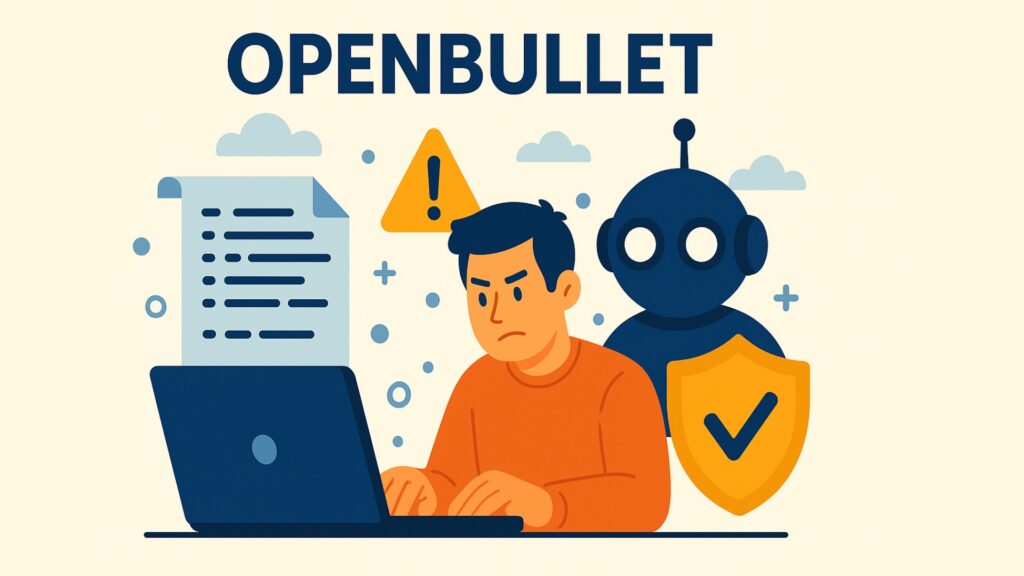
The rise of digital connectivity has introduced unprecedented convenience and innovation, but it has also opened the door to increasingly sophisticated cyber threats. One of the more controversial tools in the security landscape is OpenBullet — an open-source automation framework that, while originally developed for legitimate testing purposes, has become infamous for its misuse by cybercriminals. This article delves into what OpenBullet is, how it functions, why it’s so widely exploited, and how you can protect your digital assets against its misuse. We’ll also explore the role of captcha.eu, a GDPR-compliant CAPTCHA provider, in building effective bot protection strategies.
Table of contents
Understanding OpenBullet: Dual-Use Software
OpenBullet was created as a versatile web testing and automation tool. In its intended use, it helps developers and ethical hackers test web applications, scrape data, and perform quality assurance. The tool works through “configs” — configuration files that define how OpenBullet should interact with a website or API. These configurations detail requests, parsing rules, session handling, and validation logic.
Unfortunately, the same flexibility that makes OpenBullet powerful for legitimate tasks also makes it attractive for malicious use. Attackers exploit its capabilities to automate login attempts on thousands of websites using leaked credentials, a practice known as credential stuffing. This form of brute-force attack often leads to account takeovers, which can then be monetized through fraud, data theft, or resale on black markets.
OpenBullet in the Hands of Attackers
The widespread misuse of OpenBullet stems from how easily it can be adapted for harmful purposes. Cybercriminals feed the tool massive lists of stolen usernames and passwords, allowing it to perform rapid-fire login attempts across various platforms. These attacks exploit the unfortunate reality that many users reuse passwords across different services. When successful, attackers gain unauthorized access to personal accounts, customer portals, or even enterprise-level systems.
Once inside, attackers can quietly extract personal data, initiate unauthorized transactions, or sell access to the compromised accounts. Such intrusions can impact eCommerce platforms, SaaS applications, streaming services, and any system that allows user authentication.
Why OpenBullet Is So Dangerous?
OpenBullet’s design makes it extremely efficient for cybercriminals. It features a user-friendly graphical interface, which removes the technical barrier to entry for would-be attackers. Even users with limited scripting knowledge can automate sophisticated interactions with web applications. Furthermore, OpenBullet configurations are frequently shared or sold in online forums and hacker marketplaces, making it easy for anyone to target specific websites without deep technical understanding.
In addition, it supports proxy rotation, helping attackers mask their traffic and avoid IP-based blocking. It also integrates seamlessly with third-party CAPTCHA-solving services, allowing it to bypass traditional CAPTCHA mechanisms that many websites rely on for basic bot protection. This combination of accessibility, power, and stealth makes OpenBullet a formidable threat.
Bypassing CAPTCHA and Other Defenses
Traditional CAPTCHA systems are often unable to stop bots that use tools like OpenBullet. These bots can automatically solve visual or logic-based challenges by connecting to services like 2Captcha or Anti-Captcha. By feeding CAPTCHA challenges to these services, which employ human workers or machine learning algorithms to solve them, their bots can pass through these verification gates as if they were real users.
This exposes a significant weakness in legacy CAPTCHA systems: their reliance on static challenges. A CAPTCHA that only requires checking a box or solving a puzzle may no longer be enough. To effectively defend against OpenBullet and similar tools, websites must turn to advanced, behavior-based CAPTCHA solutions that analyze how users interact with the page in real time.
This is where captcha.eu comes in. Our GDPR-compliant CAPTCHA technology doesn’t rely on visible tests. It evaluates patterns such as cursor movement, typing behavior and submission timing — making it significantly harder for automated scripts to pass as humans.
Securing Your Website Against OpenBullet
To combat OpenBullet and similar threats, organizations must adopt a multi-layered security approach that considers both user authentication and behavioral monitoring.
Multi-factor authentication (MFA) should be a standard part of any login process. Even if credentials are compromised, a second layer of verification — such as a time-based code or app approval — greatly reduces the likelihood of unauthorized access.
Equally important is the monitoring of traffic patterns and user behavior. Bots often exhibit non-human behaviors: rapid form submissions, absence of mouse activity, and uniform click patterns. By detecting these anomalies, website operators can block or challenge suspicious activity before any damage is done.
Another line of defense is identifying automation frameworks. OpenBullet commonly uses engines like Selenium or Puppeteer, which can leave identifiable traces. Security systems that scan for these signatures — such as specific user agents or HTTP header anomalies — can recognize and stop malicious automation at the gate.
Rather than relying solely on blacklists or IP reputation databases, businesses should also adopt adaptive rate-limiting strategies. These throttle repeated access attempts from the same origin and can trigger more stringent verification if traffic volumes spike unexpectedly. This is particularly effective against proxy-based attacks, where bots try to hide behind changing IP addresses.
Modern CAPTCHA services that go beyond static puzzles are now essential. Solutions from captcha.eu include both visible and invisible integrations, allowing seamless protection of login portals, forms, and checkout pages without degrading user experience.
Why You Can’t Ignore OpenBullet
Although tools like OpenBullet may seem like a niche concern, they highlight a broader issue in web security: the ease with which malicious automation can scale. As long as attackers can acquire configs, proxies and CAPTCHA-solving services, no site is truly off-limits.
And it’s not just large corporations being targeted. Small and mid-sized businesses are equally vulnerable, especially those with weaker authentication systems or outdated CAPTCHA solutions. The consequences of a successful attack can include service downtime, legal liabilities, GDPR violations, and irreversible brand damage.
Proactive defense is the only reliable strategy. Waiting until after a breach to react can be costly, not just in financial terms but also in terms of customer trust and compliance penalties.
Conclusion
OpenBullet is a prime example of how tools intended for good can be turned into vectors for cybercrime. The challenge for modern website operators is to stay one step ahead by implementing smarter, layered defenses that consider both human and machine behavior.
Adopting modern bot protection mechanisms, deploying robust MFA, monitoring for suspicious activity, and enhancing CAPTCHA capabilities are all essential in building digital resilience.
At captcha.eu, we’re committed to helping organizations detect and block unwanted bot traffic without sacrificing usability or compliance. Our intelligent, privacy-focused CAPTCHA solutions are designed to adapt to emerging threats — giving you confidence that your users are real, your data is protected, and your platform remains secure.
If you’re serious about keeping OpenBullet and similar threats out, our team is ready to help you secure every layer of your digital presence.
FAQ – Frequently Asked Questions
What is OpenBullet used for?
OpenBullet is an open-source automation tool originally developed for tasks like data scraping, quality assurance, and penetration testing. However, it’s widely misused by cybercriminals for credential stuffing, account takeover, and bypassing website security systems.
Is OpenBullet illegal?
The tool itself is not illegal — it’s how it’s used that determines legality. If used for ethical testing on systems you own or have permission to access, it’s legal. Using it to attack or access others’ systems without authorization is illegal and considered cybercrime.
How does OpenBullet perform credential stuffing attacks?
Attackers load OpenBullet with lists of stolen login credentials from previous data breaches. The tool then automates login attempts on websites, trying to match usernames and passwords at high speed until access is gained.
Can OpenBullet bypass CAPTCHA protections?
Yes, OpenBullet can integrate with third-party CAPTCHA-solving services. This allows attackers to bypass traditional CAPTCHA challenges automatically, making older CAPTCHA systems ineffective against these threats.
How can I protect my website from OpenBullet attacks?
To defend your site, implement multi-factor authentication, intelligent bot detection, IP reputation monitoring, and behavior-based CAPTCHA solutions. Modern tools like those from captcha.eu can detect and block suspicious bot activity in real-time without harming user experience.
100 free requests
You have the opportunity to test and try our product with 100 free requests.
If you have any questions
Contact us
Our support team is available to assist you.




